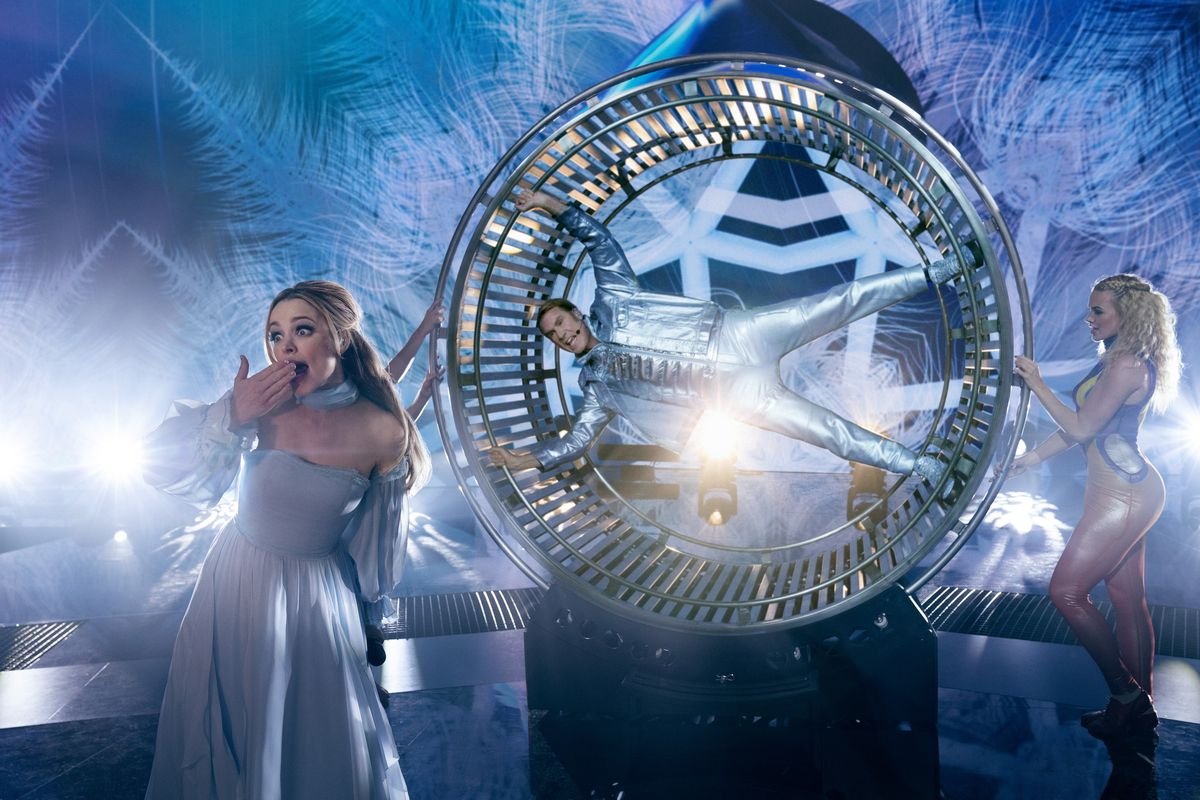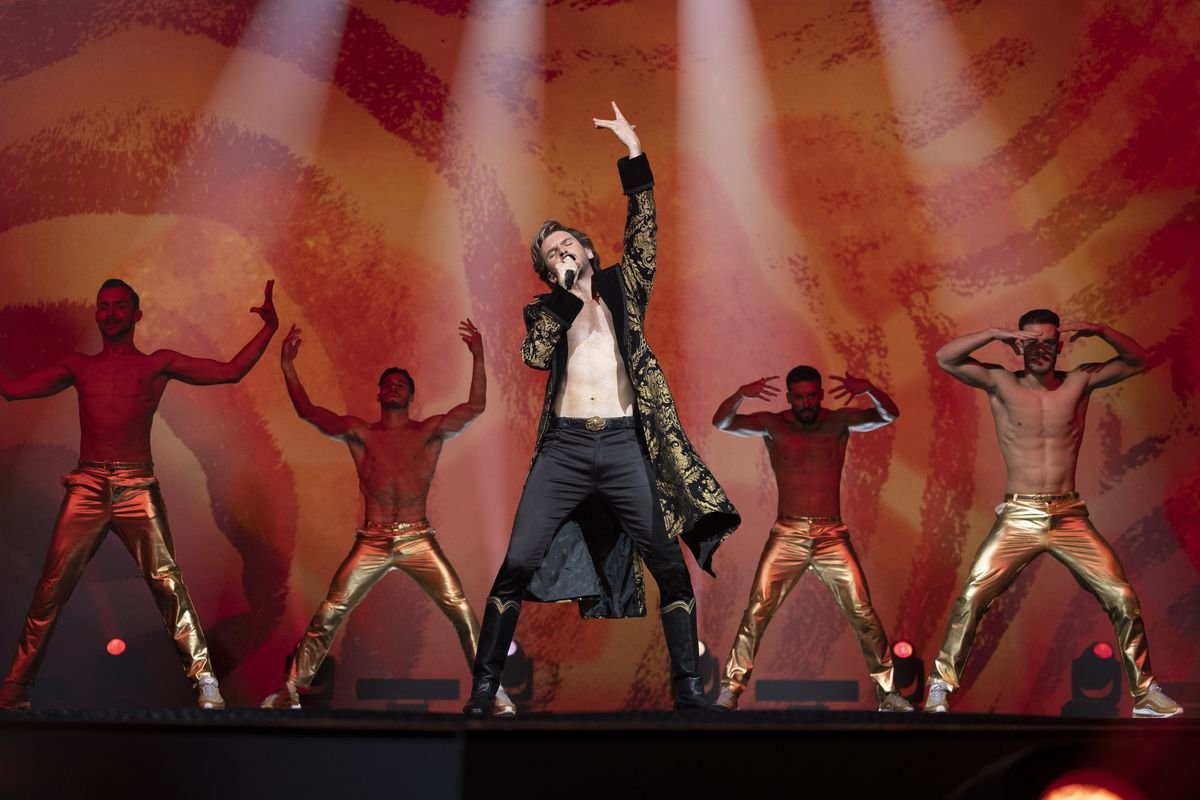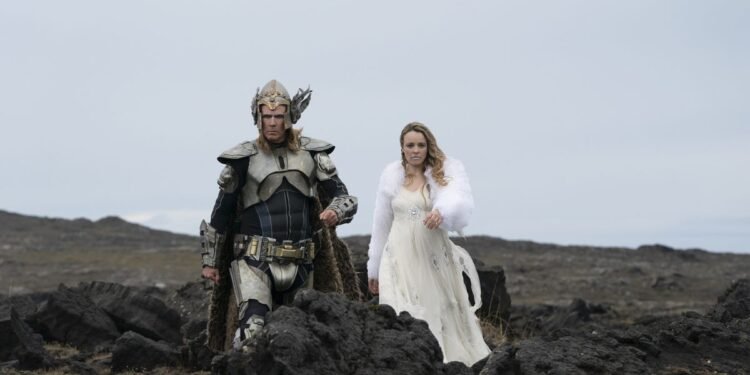The joy of doing karaoke has nothing to do with looking cool or necessarily even hitting the right notes — it’s about leaving inhibitions behind and giving your all to the moment. Simplistic as it might sound, it’s just about having fun. That sense of pure, unironic joy is what makes Netflix’s new musical comedy Eurovision Song Contest: The Story of Fire Saga really sing. Director David Dobkin doesn’t land every single beat, but he taps into that well of carefree exultation so potently that the movie’s stumbles hardly register.
In the first moments of the film, a young boy is entranced by ABBA’s performance of “Waterloo” in the real-life 1974 Eurovision contest. (The event, which has been going on since 1956, calls for European countries to submit musical acts to compete.) There’s no irony to his adoration of the group’s poppy song or glittery costumes; when the adults around him laugh at his enthusiasm, he yells at them to cut it out. One day, he says, he’ll be the one performing on the Eurovision stage.
Fast-forward to the present day, and Lars (Will Ferrell) still dreams of competing. His father Erick (Pierce Brosnan, only 15 years older than Ferrell) disapproves, but Lars is buoyed along by his childhood best friend and current musical partner Sigrit (Rachel McAdams). Their band, Fire Saga, only ever performs in Erick’s garage and in the local pub, but a chance series of events gives them a shot at Eurovision fame and fortune.

It’s easy to guess where the story is headed at any given time, and some of the jokes, from a script written by Ferrell and Andrew Steele, invite sighs rather than laughs. But the clunkers fade from memory as soon as the characters open their mouths to sing. The songs — Fire Saga’s, and every other competitor’s — are legitimately catchy, which is startling for any movie that isn’t a strict musical, but less so given that they’re written by the likes of Savan Kotecha (Katy Perry’s “Rise,” much of Ariana Grande’s Sweetener) and Andreas Carlsson (the Backstreet Boys’ “I Want It That Way” and NSYNC’s “Bye Bye Bye”). The music hasn’t been half-assed; like everything else in the film, the songs have been crafted with love.
The cast is similarly committed, particularly McAdams, who has to sell Sigrit’s devotion to Lars (and her belief in elves) without making her out to be a complete fool. The highlight, however, is Dan Stevens’ performance as Alexander Lemtov, a Russian singer also competing in Eurovision. Lemtov is as theatrical as they come — his song, “Lion Of Love,” involves a lot of suggestive movement and shirt-ripping — and Stevens leans fully into the preening, wiggling his eyebrows and winking like some kind of flirting machine. But that outsized presence doesn’t lessen the impact of a later revelation about his personal life. These characters seem silly, but that doesn’t mean they aren’t worth considering with empathy and care.

To that end, Eurovision recalls movies like Mamma Mia! and The Greatest Showman, which cannot be enjoyed while clinging to any vestige of irony. There’s no such thing as a guilty pleasure, as far as these movies are concerned; there’s only pleasure. It’s a point best made by a “song-along” halfway through the film, in which Lars and Sigrit end up at a massive house party along with past, real-life Eurovision contestants like Conchita Wurst, John Lundvik, Bilal Hassani, and Netta. The singers harmonize as they blend songs together in the kind of mash-up (“Believe,” “Waterloo,” “Ray of Light,” “I Gotta Feeling,” “Ne Partez pas Sans Moi”) that Glee could only dream of. They’re all cheesy, glittery songs, but there’s no pooh-poohing them for the sake of more “serious” art, here. Instead, the moment is triumphant. (Eurovision rambles a bit more than Mamma Mia!, but Dobkin luckily takes it less seriously than director Michael Gracey took The Greatest Showman.)
There are certainly moments where Eurovision drags, but as a de facto replacement for this year’s pandemic-cancelled contest, it’s more than suitable. Dobkin and company completely understand that the real-life contest is widely beloved because of its pure passion rather than as something to be gawked at and mocked. The movie embraces that wholehearted earnestness, and the result is an endearingly silly but never cynical comedy with songs as memorable as anything that’s been performed in the real-life contest.
Eurovision Song Contest: The Story of Fire Saga is streaming on Netflix now.
























































